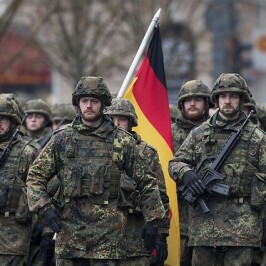
For the first time since World War II, Germany has established a permanent military presence outside its territorial borders. While the deployment of 4,800 soldiers to Lithuania appears modest, this historic shift in German strategic thinking could hold significant long-term implications for transatlantic security. Throughout the post-war period, the U.S. has guaranteed Germany’s and much of Europe’s security via extended deterrence. However, as Washington recalibrates its focus to counter an increasingly assertive China, it will need to divert resources and personnel from Europe and the Middle East to the Asia-Pacific. Despite anachronistic concerns about a resurgence of Prussian militarism, an actively engaged and capable Germany willing to contribute to deterrence and defense in Europe will facilitate America’s stagnant “Pivot to Asia.” So yes, America and the broader Western world should embrace a Germany ready to take transatlantic security seriously.
Russia’s invasion of Ukraine reminded everyone that large-scale conventional warfare between two modernized armies is possible today, even in Europe. Nowhere was this shock more evident than in the defeated powers of World War II, with both Germany and Japan tacitly moving away from their longstanding pacifist doctrines to a more combat-ready posture. Immediately following the invasion, Chancellor Olaf Scholz even went so far as to declare a “Zeitenwende,” or a historic turning point in German attitudes toward security. Though progress has been slow, as Scholz cannot reverse decades of defense industry neglect overnight, this recent announcement marks the latest effort to turn the Bundeswehr into a “war-ready” force.
While German soldiers have previously participated in NATO rotational programs, this deployment is the first independent and foreign assignment in Germany’s post-war history. At the request of the Lithuanian government, Berlin will station five units, including one armored near Vilnius and Kaunas – the capital and second-largest city, respectively. Bordered by Russia and its ally Belarus, Lithuania and the other Baltic countries represent NATO’s front lines and most vulnerable targets in the event of a conflict with Russia. Moreover, the tiny nation only fields an army of 16,000 troops, explaining why NATO presence is existential for Lithuanians. However, with the Zeitenwende still in the early phases as Germany’s defense sector lumbers out of dormancy, the brigade will remain inoperative and without actual armor until 2027. Nevertheless, Berlin has demonstrated its willingness to defend every inch of NATO territory by placing troops on the alliance’s eastern flank.
But it is not so much the strategic gains of this move that Washington should welcome but rather the broader trend it indicates. Following the Cold War, Germany has faced consistent criticism from its allies for failing to pull its weight in NATO and meet its financial obligations, specifically earmarking 2% of GDP for annual defense spending. However, this long-term commitment in Lithuania signals that Berlin has adjusted to the new security environment. In addition, as an innovation hub and Europe’s largest economy, Germany has immense potential as a leader in regional security. With encouragement from Washington, a successful Zeitenwende would reduce America’s NATO burdens and enable its reorientation to the Asia-Pacific.
What was supposed to be America’s “Asian Century” has been repeatedly bogged down by exigencies in Europe and now the Middle East. Of course, the U.S. would still play a fundamental role in NATO, and the transatlantic alliance will forever remain a cornerstone of U.S. foreign policy. But with both the capabilities and intentions to remold the world order, China must remain America’s predominant diplomatic concern.
However, many analysts have expressed historically rooted consternation over Germany’s strategic adjustment. Given Germany’s disastrous role in both World Wars, NATO integrated the country to prevent the re-emergence of deployment-capable force. Consequently, some analysts worry that this deployment to Lithuania will once again legitimize the military as a foreign policy tool in Berlin, altering their long-term approach and worldview. Put bluntly, they fear a revival of German militarism. However, such sentiments reflect outdated perceptions of Prussian Junkers and Panzer tanks while failing to account for the military-cultural changes within Germany since 1945. Modern Germany is not the same country that invaded France three times in one lifetime. Additionally, NATO’s Article 5, which declares an attack on one as an attack against all, effectively thwarts any future German expansionism in Europe.
On a more realistic note, there are legitimate apprehensions regarding the feasibility of enduring German security contributions. To be sure, Scholz’s Zeitenwende is far from fruition, and years of persistent reform are necessary to transform the country’s defense industry. Berlin has notoriously overlooked its military since the end of the Cold War to the point of dilapidation, with 85% of buildings in its once renowned artillery school requiring urgent renovation. When Russia invaded Ukraine, Germany only possessed enough ammunition for 48 hours of combat. Berlin has since dispatched almost its entire arsenal to Kyiv, including tanks, artillery, and ammunition. And while Scholz has recommitted to the 2% NATO threshold, his country remains years away from satisfying the requirement. Furthermore, while Europe stands united today, it is reasonable to question whether Germany will continue along this path when the war ends.
The recent commitments in Lithuania strongly suggest that the Zeitenwende is not a fleeting policy initiative. Even if the recent announcements unfold as planned, Washington should diligently engage its European allies to coordinate and deepen their security infrastructures. Given their economies and technological expertise, there is no reason why the combined efforts of Germany, France, and the U.K. cannot sustain Ukrainian resistance in America’s absence. Yes, Washington should continue to support Ukraine, but the days when its security assurances allowed European powers to disregard defense expenditures are over. A self-sufficient Europe depends on a capable Germany, which, in turn, reinforces transatlantic interests and values. Additionally, America will find itself in a better position to address its pacing challenge of the century in a rising China.